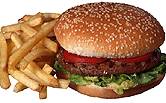
THURSDAY, March 1 (HealthDay News) – Here’s one more reason to avoid trans fats in your diet, especially if you are an older woman: A new study found a 39 percent increased risk of stroke among postmenopausal women who ate the highest amount of this common ingredient in baked goods, fast food and packaged products.
The research, done at the University of North Carolina in Chapel Hill, did find that women who took aspirin regularly had a significantly reduced stroke risk.
But the study author stressed that the second discovery does not mitigate the first.
“The findings don’t mean that you can eat trans fats and just take an aspirin,” said Dr. Ka He, who added that the study showed an association and not a cause-and-effect relationship between aspirin use and lower incidence of strokes. He compared it to thinking that a smoker “could just exercise” to cancel the effect of cigarettes.
Men, who were not included in the study, are less likely to benefit from aspirin due to a gender influence that is not yet fully understood, He said.
“We recommend a reduced intake of trans fats” to avoid heart disease and stroke, added He, an associate professor of nutrition and epidemiology at UNC’s Gillings School of Global Public Health.
Strokes are the fourth leading cause of death and the leading cause of disability among adults in the United States, according to the American Heart Association.
Strokes occur when an artery carrying blood to the brain is either blocked or bursts, cutting off the flow of blood and oxygen. As a result, brain cells start to die. Strokes can affect speech, motor skills or cognitive functions, depending on which part of the brain is damaged.
Risk factors for strokes include obesity, smoking, hypertension and lack of exercise. Drinking too much alcohol, or none at all, is also associated with strokes.
In the UNC study, which was published online March 1 in the Annals of Neurology, researchers analyzed data from the national project known as the Women’s Health Initiative. They looked at the trans-fat intake of more than 87,000 women aged 50 to 79 using a dietary database developed at the University of Minnesota and questionnaires that measured trans-fat consumption.
Participants were asked how much of 122 foods they ate in the three months before the study, with follow-up surveys taken three years later. Medical histories were updated annually between 1998 and 2005, and 1,049 strokes were documented during that time.
No association was found between eating other types of fat and ischemic stroke, by far the most common type of stroke in the United States, He said.
Trans fats contribute to cardiovascular disease — one of the risk factors for stroke — by raising bad cholesterol and lowering good cholesterol, and may have the worst impact on health of all fats, He said.
Trans fats are rare in nature, but “can commonly occur in foods as a result of food processing when a liquid vegetable oil is turned into a solid fat,” explained Nancy Copperman, director of public health initiatives at the North Shore-Long Island Jewish Health System in Great Neck, N.Y.
“It is interesting to note that the women who consumed the most trans fat also had other unhealthy lifestyle behaviors such as decreased physical activity, increased energy intake and smoking,” said Copperman, adding that they also had a higher incidence of diabetes.
Encouraging women to eat a balanced diet and maintain a healthy lifestyle can be “a major step in preventing stroke and other lifestyle-related diseases,” she said.
Public-policy legislation limiting trans fats in food has reduced their availability, she added. Some metropolitan areas, including New York City, have banned trans fats in foods served in restaurants.
Another expert noted that the study “is really telling us the power of fat in the diet.”
“Trans fats are not really a part of a healthy diet,” said Dr. Suzanne Steinbaum, director of women and heart disease at Lenox Hill Hospital in New York City. She called trans fats “toxic,” adding that “this is one ingredient in food we should not be eating at all.”
She also urged consumers to read food labels because trans fats sometimes can be included in reduced-fat foods.
“Just because it says ‘reduced fat’ doesn’t mean it’s healthy,” Steinbaum noted.
More information
To learn more about dietary fats, visit the U.S. National Library of Medicine.

